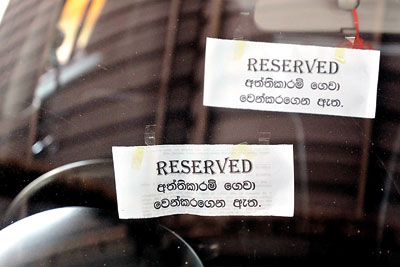News
Vehicle market running on low gear
The used Mercedes Benz C180 cost the marketing executive Rs 7mn in August 2021. He had bought it from a friend. Today, the twice-owned vehicle is between Rs 11.5 and 12mn.
It recently needed work done. “Normally, a repair would have taken a week,” the 23-year-old said. “This time, it took three weeks.” He did not wish to be named.

Pre owned cars on sale. Pix by M.A. Pushpa Kumara
Vehicle owners around the country are crippled by the non-availability of spare parts. He is now trying to sell his car to buy another for which spare parts would be available more freely.
Registered spare parts agents are out of stocks and cannot import owing to the foreign exchange crisis. Dealerships and authorised agents have long waiting lists and brand new spare parts are difficult to access as upfront payment is required.
“There is a huge demand but we can’t supply,” said Marlan Ranasinghe, President of the Lanka Motor Spare Parts Dealers Association (LMSPDA). He has been in the industry for 37 years.
Demand is also higher as there are more sales of available cars owing to import restrictions. Old vehicles are being turned in for repair and they need spares. Genuine replacement parts are supplied from Malaysia, Taiwan and China. But forex payment restrictions introduced by the Government have hampered payments.
There has been a 30-40 percent increase in the prices of spare parts over one year. Shock absorbers have sky-rocketed by 25 percent. “Consumers have to think twice before they make purchases,” Mr Ranasinghe said.
“At Panchikawatte, there are hundreds of people in every shop but no spare parts because of the scarcity,” said Indula Chandrasiri, a 22-year-old trainee in a prominent car dealership. He is also a mechanical engineering student from a family with longtime experience in the automotive industry. 
There is now a yawning price difference in cars. A car manufactured in 2003 and one manufactured in 2012 have a price gap of Rs 8-10mn. Consequently, there is a demand for older cars but they necessarily need more spare parts. And a lot of Sri Lankans are trying to achieve the “new car experience” from old cars, Mr Chandrasiri observed, and overhaul them.
“Vehicle prices have gone up 70-80 percent now,” said Sarath Yapa Bandara, Chairman of Punchi Car Niwasa (Pvt) Ltd. There is a surge in the demand for available cars. The Maruti Wagon R which sold at Rs 3 million in 2015 is now between Rs 4-5mn. The Indian Alto which was between Rs 1.7 and 1.8mn is now Rs 3 million.
Meanwhile, there are sellers who pump up prices to earn a profit, Mr Bandara said. But there are currently enough used cars in the market to meet demand. “People who use two or three vehicles are selling one because it is profitable for them,” he pointed out.
There are many potential buyers for electric cars, he added, expressing the hope that imports will be allowed soon. He admitted that there must be a sufficient electricity supply with solar energy being introduced at charging stations.
Mr Bandara’s showroom in Malabe had over 200 pre-owned vehicles on display. Outlanders sell for Rs 13.9 million; Aqua for Rs. 6.8-7mn; and a Panda for Rs 3-4mn. “Some days, we don’t sell any vehicles, sometimes it’s only two or three,” employees said. “Then, there are some weekends when we sell 10 to 15 vehicles.”
“We are trying to sustain ourselves with the sale of pre-owned vehicles,” said the General Manager of Sales at a well-known car dealership in Wattala. He did not wish to be named or the business identified. The only new vehicles that enter Sri Lanka are a handful of special orders. People hired to market and sell new vehicles are focusing on the pre-owned sector.
“There is a possibility that this situation will persist for the rest of the year if import restrictions continue,” the GM said.
“Fuel consumption, spare parts availability and complexity of the vehicle are three important facts to consider before purchasing a car,” said Sahas Gunasekara, a 22-year-old car enthusiast. According to data from Lanka IOC, fuel prices have skyrocketed with Petrol 95 Octane at Rs 213, Petrol 92 Octane at Rs 184, Auto Diesel at Rs 162 and Euro 3 at Rs 193. Commonly used vehicles like Wagon R, Toyota Premio are expensive due to inflation.
Under present conditions, even the definition of a “usable” car has expanded. Classic, vintage cars, too, are being purchased.
“Many Sri Lankans consider a vehicle as an investment on wheels and a symbol of success, but the prices of vehicles now are bonkers,” he said. Generally, enthusiasts purchase cars that aren’t part of mainstream demand. The issue with classic cars is that they aren’t dependable or reliable with less-than-optimum fuel consumption and scarce spare parts.
Mr Gunasekara owns a 1998 Starlet that he purchased for Rs 2mn in August 2018 which is now Rs 3.5mn. Reconditioned parts are available in Nugegoda but the inventory is low.
The best way to say that you found the home of your dreams is by finding it on Hitad.lk. We have listings for apartments for sale or rent in Sri Lanka, no matter what locale you're looking for! Whether you live in Colombo, Galle, Kandy, Matara, Jaffna and more - we've got them all!

